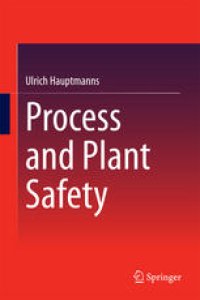
Ebook: Process and Plant Safety
Author: Ulrich Hauptmanns (auth.)
- Genre: Technique // Safety and Security
- Tags: Quality Control Reliability Safety and Risk, Safety in Chemistry Dangerous Goods, Industrial Pollution Prevention
- Year: 2015
- Publisher: Vieweg+Teubner Verlag
- Edition: 1
- Language: English
- pdf
Accidents in technical installations are random events. Hence they cannot be totally avoided. Only the probability of their occurrence may be reduced and their consequences be mitigated. The book proceeds from hazards caused by materials and process conditions to indicating technical and organizational measures for achieving the objectives of reduction and mitigation. Qualitative methods for identifying weaknesses of design and increasing safety as well as models for assessing accident consequences are presented. The quantitative assessment of the effectiveness of safety measures is explained. The treatment of uncertainties plays a role there. They stem from the random character of the accident and from lacks of knowledge on some of the phenomena to be addressed. The reader is acquainted with the simulation of accidents, safety and risk analyses and learns how to judge the potential and limitations of mathematical modelling. Risk analysis is applied amongst others to “functional safety” and the determination of “appropriate distances” between industry and residential areas (land-use planning). This shows how it can be used as a basis for safety-relevant decisions. Numerous worked-out examples and case studies addressing real plants and situations deepen the understanding of the subjects treated and support self-study.
Target groups
Chemical and petrochemical industry, licensing authorities, testing and certification bodies, safety engineers, engineering , students of process, chemical and mechanical engineering as well as of industrial and engineering chemistry.
Accidents in technical installations are random events. Hence they cannot be totally avoided. Only the probability of their occurrence may be reduced and their consequences be mitigated. The book proceeds from hazards caused by materials and process conditions to indicating technical and organizational measures for achieving the objectives of reduction and mitigation. Qualitative methods for identifying weaknesses of design and increasing safety as well as models for assessing accident consequences are presented. The quantitative assessment of the effectiveness of safety measures is explained. The treatment of uncertainties plays a role there. They stem from the random character of the accident and from lacks of knowledge on some of the phenomena to be addressed. The reader is acquainted with the simulation of accidents, safety and risk analyses and learns how to judge the potential and limitations of mathematical modelling. Risk analysis is applied amongst others to “functional safety” and the determination of “appropriate distances” between industry and residential areas (land-use planning). This shows how it can be used as a basis for safety-relevant decisions. Numerous worked-out examples and case studies addressing real plants and situations deepen the understanding of the subjects treated and support self-study.